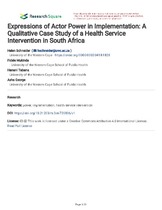| dc.contributor.author | Schneider, Helen | |
| dc.contributor.author | Mukinda, Fidele | |
| dc.contributor.author | Tabana, Hanani | |
| dc.date.accessioned | 2021-08-31T09:08:06Z | |
| dc.date.available | 2021-08-31T09:08:06Z | |
| dc.date.issued | 2021 | |
| dc.identifier.citation | Schneider, H. (1828). Expressions of actor power in implementation: A qualitative case study of a health service intervention in South Africa. 1–22. | en_US |
| dc.identifier.issn | 2693-5015 | |
| dc.identifier.uri | 10.21203/rs.3.rs-720836/v1 | |
| dc.identifier.uri | http://hdl.handle.net/10566/6547 | |
| dc.description.abstract | Implementation frameworks and theories acknowledge the role of power as a factor in the adoption (or
not) of interventions in health services. Despite this recognition, there is a paucity of evidence on how
interventions at the front line of health systems confront or shape existing power relations. This paper
reports on a study of actor power in the implementation of an intervention to improve maternal, neonatal
and child health care quality and outcomes in a rural district of South Africa.A retrospective qualitative case study based on interviews with 34 actors in three ‘implementation units’ –
a district hospital and surrounding primary health care services – of the district, selected as purposefully
representing full, moderate and low implementation of the intervention some three years after it was first
introduced. Data are analysed using Veneklasen and Miller’s typology of the forms of power – namely
‘power over’, ‘power to’, ‘power within’ and ‘power with’. | en_US |
| dc.language.iso | en | en_US |
| dc.publisher | Research Square | en_US |
| dc.subject | Power | en_US |
| dc.subject | Implementation | en_US |
| dc.subject | Health service intervention | en_US |
| dc.subject | South Africa | en_US |
| dc.title | Expressions of actor power in implementation: A qualitative case study of a health service intervention in South Africa | en_US |
| dc.type | Article | en_US |

